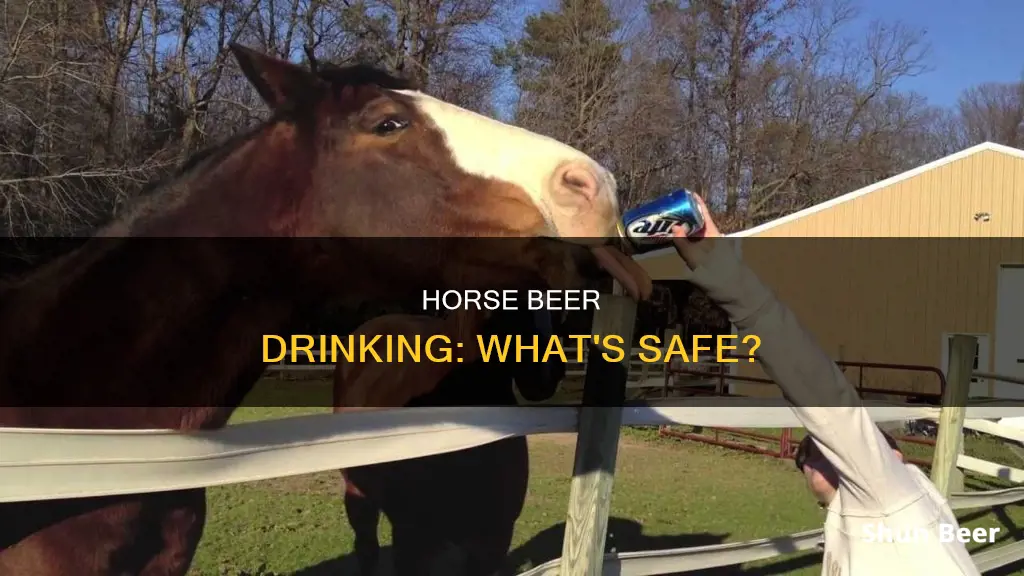
The idea of sharing a beer with your horse may seem amusing or tempting, but it's important to understand the potential health implications. While the practice of giving horses beer, especially Guinness, is common among equestrians, racehorse trainers, and owners, it's crucial to weigh the potential risks against any perceived benefits. In this article, we will delve into the reasons why people give beer to horses, explore the potential consequences for their health and well-being, and provide expert opinions on this intriguing topic. So, can a horse drink beer? Let's find out.
| Characteristics | Values |
|---|---|
| Common reasons for giving horses beer | Treatment for certain medical conditions, gastrointestinal supplement, post-workout recovery |
| Scientific evidence supporting the above | None |
| Other reasons for giving horses beer | Taste, tradition, gesture of goodwill |
| Beer as a treatment for anhidrosis | Not scientifically proven |
| Beer as a supplement for Cushing's | Scientific jury is still out |
| Types of beer given to horses | Guinness stout, IPA, Budweiser, lager, ale, stout, Corona, Modelo |
| How beer is given to horses | Mixed in feed or water, poured into a bucket |
| Recommended amount of beer for horses | One to two beers a week, no more than one beer a day |
| Potential risks of giving beer to horses | Digestive issues, neurological impairment, dehydration, liver damage, behavioural changes |
| Expert opinion on giving beer to horses | Strongly advised against by veterinarians and nutritionists |
What You'll Learn

Is beer safe for horses to drink?
The idea of giving beer to horses is not new and has been a practice amongst equestrians for many years, especially racehorse trainers. Famous horses Tapit and Zenyatta are known to have enjoyed a Guinness on occasion. However, the crucial question remains: is it safe?
Beer contains several components that could potentially benefit a horse's health. Guinness stout beer, for example, is made from yeast (Saccharomyces cervisiae), which is often found in probiotics in feed and supplements. Yeast provides the B-vitamin complex, an important nutritional component in helping horses recover from stress and supporting their digestive health. Additionally, Guinness contains hops, which have been recognised for their antimicrobial properties and digestive benefits in Traditional Chinese Medicine.
Despite these potential health benefits, it is important to consider the risks associated with giving beer to horses. Alcohol is the primary intoxicating component in beer and can have detrimental effects on a horse's health and well-being. Horses have delicate digestive systems that are not equipped to handle alcohol, and consumption could lead to gastrointestinal distress, diarrhoea, and potentially life-threatening conditions like colic. Alcohol can also impair a horse's cognitive abilities, coordination, and balance, increasing the risk of falls or accidents.
Furthermore, alcohol is a diuretic, which can lead to dehydration, a serious issue for horses, especially during hot weather or after strenuous activities. Prolonged or excessive alcohol intake can also strain a horse's liver, potentially resulting in liver disease or failure. Additionally, behavioural changes may occur, with alcohol making horses unpredictable, aggressive, or docile.
While the tradition of giving beer to horses may be tempting, the potential risks outlined by experts in the field, including veterinarians and equine nutritionists, strongly advise against it. The risks far outweigh any perceived benefits, and the priority should always be the well-being of these sensitive animals.
If you suspect your horse is suffering from a medical condition, always seek the advice of a qualified veterinarian before attempting any treatment, including the administration of beer.
Beer and Vitamin D2: What's the Verdict?
You may want to see also

What are the potential health benefits of beer for horses?
While the idea of giving beer to horses may seem amusing or tempting, it is important to carefully consider the potential health benefits and risks. Beer has been a long-standing tradition for many equestrians, especially racehorse trainers, and is often given to horses as a gesture of goodwill or as an "old-fashioned" remedy. Here are some of the potential health benefits of beer for horses:
Treatment for Anhidrosis
Anhidrosis is a condition that affects horses in hot, humid climates, causing them to stop sweating, which can lead to overheating and potentially life-threatening consequences. While there is no scientifically proven treatment for anhidrosis, some people believe that giving the affected horse a can of beer every day helps solve the issue. The yeast in beer, specifically Saccharomyces cerevisiae, is thought to help stabilize the equine hindgut and may be useful in medical cases of colitis. Additionally, the B vitamins in beer are essential for maintaining healthy skin and a shiny coat, which can be beneficial for horses with anhidrosis.
Gastrointestinal Supplement
Beer contains yeast, a vital component in beer-making. The strain Saccharomyces cerevisiae, used in beer production, is also used to formulate equine probiotics. This yeast may help promote a healthy gut and support the digestive system of horses. Additionally, hops, the flower part of the hop plant added to beer for bitterness, aroma, and flavor, are being investigated by researchers for their potential to control gastrointestinal imbalances and prevent pasture laminitis.
Post-Workout Recovery
Beer is a good source of carbohydrates, iron, vitamins, and B vitamins, which can aid in muscle recovery after strenuous exercise. The B vitamins in beer help the body generate energy and support overall metabolic function. Additionally, the iron content in beer can help increase red blood cell production, improving oxygen delivery to the muscles.
Appetite Stimulant
Beer can also be used to stimulate the appetite of picky eater horses, ensuring they consume enough nutrients to maintain their health and performance.
It is important to note that the potential health benefits of beer for horses are not based on extensive scientific evidence, and the risks associated with alcohol consumption in horses should not be overlooked. Beer should be given in moderation, and it is always recommended to consult with a veterinarian before introducing any new substance into a horse's diet.
Hamilton Pool's Beer Rules: What You Need to Know
You may want to see also

What are the risks of giving beer to horses?
While some sources claim that there are potential health benefits to giving horses beer, there are also several risks to consider.
Firstly, horses have a delicate digestive system that is not equipped to handle alcohol. Consuming beer could lead to gastrointestinal distress, diarrhea, and potentially life-threatening conditions like colic. Alcohol can also impair a horse's cognitive abilities, coordination, and balance, leading to dangerous situations such as falls or accidents during riding or handling.
Another risk is dehydration. Alcohol is a diuretic, which increases urine output and can lead to dehydration, especially during hot weather or strenuous activities. This can become a serious and rapid issue for horses.
Prolonged or excessive alcohol consumption can also strain a horse's liver, potentially leading to liver disease or failure. Additionally, alcohol can alter a horse's behavior, making them unpredictable, aggressive, or docile.
It is worth noting that these risks can vary depending on the amount of beer consumed, the horse's size, age, and overall health condition. However, given the potential risks, it is strongly advised against giving beer or any alcoholic beverage to horses. Their diet should consist of hay, grains, and fresh water only.
Beer and Colonoscopy: Drinking Timeline for Procedure
You may want to see also

What type of beer is best for horses?
While it is not recommended to give beer to horses, if you are going to do so, it is best to opt for a dark, stout beer made with hops, barley, and yeast. Light beers are generally not advisable as they are often made with rice, which is less appetising and nutritious for horses than barley. Unfiltered and unpasteurised beers contain more beneficial active yeast cultures and B vitamins than pasteurised beers.
Guinness stout beer is a popular choice among horse owners and is often recommended by veterinarians to treat anhidrosis, a condition that causes horses to stop sweating properly, leading to potential overheating and dangerous consequences. Guinness is also believed to stimulate the appetite of picky eaters. It is made from yeast, which provides the B-vitamin complex, aiding in the recovery of horses from stress and providing important probiotic support. Additionally, Guinness contains the herb hops, which has been used as a digestive aid and to treat intestinal ailments. The beer also includes malted barley, a good source of B-vitamins and minerals like iron, copper, manganese, and selenium.
It is important to note that the decision to give beer to horses is controversial, and many experts advise against it. The potential risks associated with alcohol consumption in horses, such as digestive issues, neurological impairment, dehydration, liver damage, and behavioural changes, should be carefully considered.
The Science Behind Fizzics Beer: How Does It Work?
You may want to see also

How much beer can a horse safely consume?
While it is not recommended to give beer to horses, if you are going to do so, moderation is key. One source recommends a maximum of one beer per day for a horse, while another suggests one to two beers per week.
The amount of beer a horse can safely consume depends on several factors, including the horse's size, age, and overall health. Due to their large size, it is unlikely that a single beer per day will significantly impact a horse. However, too much beer could potentially lead to adverse side effects such as weight gain and gastrointestinal issues.
It is important to note that the potential risks of giving beer to horses include digestive issues, neurological impairment, dehydration, liver damage, and behavioural changes. Therefore, it is always best to consult with a veterinarian before introducing any new substances into a horse's diet.
Leftover Beer: Is It Safe to Drink?
You may want to see also
Frequently asked questions
While it is not recommended, it is unlikely that a beer a day will have a significant impact on a horse's body due to their size. However, it is important to note that alcohol can have detrimental effects on a horse's health and well-being, including digestive issues, neurological impairment, dehydration, liver damage, and behavioural changes.
Beer is believed to be a good source of B vitamins, which help with metabolism and energy generation, as well as maintaining healthy skin and hair. It is also said to be a source of yeast, which can be beneficial for the horse's digestive system. Additionally, the hops in beer may have potential gastrointestinal benefits and help prevent pasture laminitis.
Some horse owners give their horses beer as a traditional treatment for anhidrosis, a condition where horses do not sweat properly, which can lead to overheating and have dangerous consequences. It is also given as a gesture of goodwill, a treat after a race or event, and to promote post-workout recovery.
Horses can drink almost any type of beer, but most recommend a dark, stout beer made with hops, barley, and yeast, such as Guinness. Light beers are generally not recommended as they are often made with rice, which is less appetising and nutritious for horses than barley.







